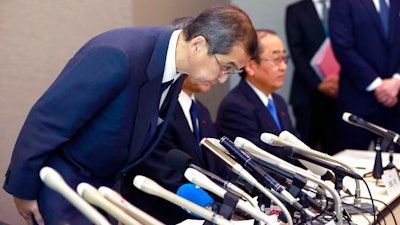
Shattered by recall costs and lawsuits, Japanese air bag maker Takata Corp. filed Monday for bankruptcy protection in Tokyo and the U.S., saying it was the only way it could keep on supplying replacements for faulty air bag inflators linked to the deaths of at least 16 people.
The company's bankruptcy filings cleared the way for a $1.6 billion takeover of most of Takata's assets by rival Key Safety Systems, which is based in Detroit but owned by a Chinese company.
Takata's inflators can explode with too much force when they fill up an air bag, spewing out shrapnel. Apart from the fatalities, they're responsible for at least 180 injuries worldwide.
So far 100 million inflators have been recalled worldwide, the largest automotive-related recall in U.S. history. That includes 69 million in the U.S., affecting 42 million vehicles.
Takata's president Shigehisa Takada told reporters in Tokyo that with the company rapidly losing value, filing for bankruptcy protection was the only way it could carry on.
"We're in a very difficult situation, and we had to find ways to keep supplying our products," Takada said. "As a maker of safety parts for the automobile industry, our failure to maintain a stable supply would have a major impact across the industry."
"There was no other way," he said.
Takada said he intends to leave Takata's management once it is handed over to Key Safety Systems and things are running smoothly.
"It would be a big nuisance for the new company if a person like me were to get involved in its management," he said.
The bankruptcy filings by Takata, founded in 1933 as a textiles maker, led the Tokyo Stock Exchange to announce Monday it was delisting the company.
Under its agreement with Key, remnants of Takata's operations will continue to make inflators to be used as replacement parts in the recalls, which are being handled by 19 affected automakers.
Takata will use part of the sale proceeds to reimburse the automakers, but experts say the companies still must fund a significant portion of the recalls themselves.
The process could take years. One of Takata's lawyers, Nobuaki Kobayashi, said it was too early to estimate the total eventual cost of the recalls and would not confirm Japanese media reports that they exceeded 1 trillion yen ($9 billion).
"It's likely every automaker involved in this recall will have to subsidize the process because the value of Takata's assets isn't enough to cover the costs of this recall," said Karl Brauer, executive publisher of Kelley Blue Book and Autotrader.
Japan's Ministry of Economy, Trade and Industry said Monday it was setting up "advice windows" to help any affected small and medium-sized suppliers that might face difficulties due to Takata's troubles.
More than 70 percent of the airbags recalled in Japan have been replaced, and 36 percent in the U.S., said Hiroshi Shimizu, a Takata vice president. He said progress of the recalls in other countries was unknown.
Takata and the automakers were slow to address the problem with the inflators despite reports of deaths and injuries. Eventually they were forced to recall tens of millions of vehicles. The scope of the recalls means some car owners face lengthy waits for replacement parts, meanwhile driving cars with air bags that could malfunction in a crash.
The problems stem from use of the explosive chemical ammonium nitrate in the inflators used to deploy air bags in a crash. The chemical can deteriorate when exposed to hot and humid air and burn too fast, blowing apart a metal canister.
At least $1 billion from the sale to Key is expected to be used to satisfy Takata's settlement of criminal charges in the U.S. for concealing problems with the inflators. Of that amount, $850 million goes to automakers to help cover their costs from the recalls. Takata already has paid $125 million into a fund for victims and a $25 million fine to the U.S. Justice Department.
Attorneys for those injured by the inflators worry that $125 million won't be enough to fairly compensate victims, many of whom have serious facial injuries from metal shrapnel. One 26-year-old plaintiff will never be able to smile due to nerve damage, his attorney says.
The lead attorney for people suing the automakers said in a statement following the announcement that he doesn't expect the bankruptcy to affect the pending claims against the companies. Settlement agreements with Toyota, Subaru, BMW and Mazda already have won preliminary court approvals, said the attorney, Peter Prieto.
That settlement will speed the removal of faulty inflators from 15.8 million vehicles and compensate consumers for economic losses, Prieto said. Claims are continuing against Honda, Ford, Nissan and Takata.
Key makes inflators, seat belts and crash sensors for the auto industry and is owned by China's Ningbo Joyson Electronic Corp. Its global headquarters and U.S. technical center is in Sterling Heights, Michigan.
Key said it won't cut any Takata jobs or close any of Takata's facilities.
The Takata corporate name may not live on after the bankruptcy. The company says on its website that its products have kept people safe, and it apologizes for problems caused by the faulty inflators. "We hope the day will come when the word 'Takata' becomes synonymous with 'safety,'" the website says.






















